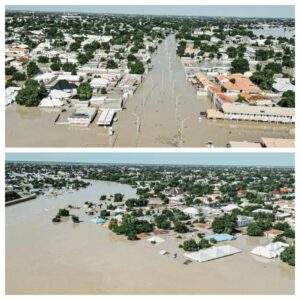- Home
- Features
- Business
- Active
- Sports
- Shop
Top Insights
BNers, Here’s How You Can Support Those Affected by the Maiduguri Floods


Credit: Bayo Onanuga/X
In Maiduguri, the capital of Borno State in Northeastern Nigeria, over 239,000 people have been severely impacted by flash floods after the Alau Dam in Konduga LGA burst its banks overnight following heavy rains. The torrential downpour across the region has also caused significant flooding in other areas, including Biu, Chibok, Bama, Dikwa, and Jere LGAs.
According to the National Emergency Management Agency (NEMA), about 70% of Maiduguri has been submerged by the fast-moving waters. Major city locations such as the Sanda Kyarimi Park Zoo, the Shehu of Borno’s palace, the state secretariat, the University of Maiduguri Teaching Hospital, and several residential areas like Bulabulin, Gwange, and Lagos Area have been heavily affected.
“About 70 per cent of the town is already underwater. So, many people are trapped as the flood intensified when people were sleeping; some people woke up to discover that they were inside water,” NEMA spokesman, Manzo Ezekiel, told The PUNCH Newspaper.
This flood has been described as the most devastating in Borno’s history, with many residents comparing it to the last major flood in 1994, but emphasising that this is far worse. Thousands of people have been displaced, forced to seek refuge in schools after losing their homes. The floods have claimed 80% of the animals in the city’s zoo and submerged key city landmarks.
President Bola Ahmed Tinubu has expressed concern over the disaster and instructed Vice President Kashim Shettima to visit the affected areas. In a statement by Bayo Onanuga, the President’s Special Adviser on Information and Strategy, Tinubu called for the immediate evacuation of residents and ordered rescue operations to be expedited.
Many of the displaced residents have moved to the Muna IDP camp, already home to more than 50,000 internally displaced persons. Government authorities have reopened former IDP camps, including the Bakasi and Dalori camps, to accommodate evacuees. However, these temporary shelters are already at full capacity. El Miskin camp, which hosts over 7,000 IDPs—half of whom are children—has also been flooded, adding to the humanitarian crisis.
Across Nigeria, floods have claimed more than 200 lives this year and affected over 800,000 people across 29 states, according to data from the National Emergency Management Agency (NEMA). As of 9 September, has the highest number of displaced individuals. Other heavily affected states include Bauchi, Bayelsa, Enugu, Jigawa, Kano, Niger, Sokoto, and Zamfara. Tens of thousands of hectares of farmland have been destroyed ahead of the harvest season, exacerbating food security concerns amid record spikes in food and fuel prices.
What the Displaced Residents Need
The displaced residents of Maiduguri are in urgent need of necessities, including food, clean water, shelter, and medical care. Protection is a significant concern, especially for unaccompanied children, the elderly, and people with disabilities. Immediate assistance is required to prevent disease outbreaks, particularly cholera, in overcrowded shelters.
Intermediate needs include non-food items such as blankets, clothing, hygiene supplies, and cooking equipment.
How You Can Help
- Donate: Support local and international organisations working in the affected regions by donating money, food, and medical supplies.
- Spread Awareness: Use your platform to raise awareness about the floods and the urgent needs of the displaced people. Social media, blogs, and community outreach can help gather support.
- Volunteer: If you are in the region or able to travel, volunteering with relief agencies can make a direct impact.
- Advocate for Long-term Solutions: Encourage governments and organisations to implement flood control measures, improve drainage systems, and invest in long-term infrastructure to prevent future disasters.
- Partner with NGOs: Work with non-governmental organisations to coordinate the delivery of essential services and items to affected areas.
The post BNers, Here’s How You Can Support Those Affected by the Maiduguri Floods appeared first on BellaNaija – Showcasing Africa to the world. Read today!.
Recent Posts
Categories
Related Articles
The kidnappers of the National President of the Afenifere National Youth Council,...
ByglobalreutersFebruary 22, 2025A few hours before the scheduled local government elections in Osun State,...
ByglobalreutersFebruary 22, 2025You know those people who always look effortlessly stunning in photos? Like,...
ByglobalreutersFebruary 21, 2025In what is being called the largest crypto theft in history, major...
ByglobalreutersFebruary 21, 2025




Leave a comment